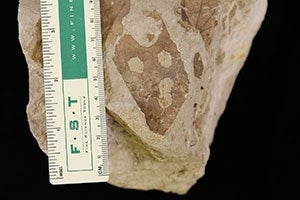Despite widespread insect declines, plants are experiencing “unprecedented levels of insect damage” in comparison to their fossilized counterparts, according to new research by a trio of scientists including UC Davis entomologist Emily Meineke.
Their work appeared Oct. 10 in Proceedings of the National Academy of Sciences (PNAS). The first-of-its-kind study compares insect herbivore damage of modern-era plants with that of fossilized leaves dating as far back as 67 million years ago.
“Our work bridges the gap between those who use fossils to study plant-insect interactions over deep time and those who study such interactions in a modern context with fresh leaf material,” said lead researcher and ecologist Lauren Azevedo-Schmidt, formerly of the Department of Biology, University of Wyoming and now a postdoctoral research associate with the Climate Change Institute, University of Maine. “The difference in insect damage between the modern era and the fossilized record is striking.”
Azevedo-Schmidt collaborated with Ellen Currano, a professor at the University of Wyoming, and Meineke, an urban landscape entomologist and assistant professor in the UC Davis Department of Entomology and Nematology.
“Plants and insects are the most diverse lineages on earth, but their interactions in the face of climate and other global changes are poorly understood…despite insect declines, insect damage to plants is elevated in the modern era compared with other time periods represented in the fossil record,” they wrote. “Plants today are experiencing unprecedented levels of insect herbivory, with unknown consequences for plant fitness and evolution.”
Fossilized leaves provide the longest running record of plant–insect herbivore associations, the researchers wrote. Studies of fossilized leaves have given insight into the links between environmental conditions, herbivore diversity, and feeding damage on leaves in the deep past. However, this is the first study to compare herbivory in the past with the modern era.
Unprecedented insect damage

The scientists estimated damage frequencies and diversities on fossil leaves from the Late Cretaceous (67 million years ago) through the Pleistocene (two million years ago) and compared these estimates with recent (post-1955) leaves collected from three modern ecosystems: Harvest Forest in Petersham, Mass.; the Smithsonian Environmental Research Center of Chesapeake Bay; and the La Selva Research Station, Costa Rica, a private forest reserve.
The percentage of leaves with any herbivore damage is greater in the modern ecosystems than in any fossil locality studied, they found.
"Our results demonstrate that plants in the modern era are experiencing unprecedented levels of insect damage, despite widespread insect declines," they wrote. Even within the modern specimens, leaves collected since 2000 were more likely to have insect damage than those collected in the early 1900s.
Humans are affecting ecosystems in multiple ways, through global climate change and its effects on both plants and insects, but also through deforestation, urbanization and the introduction of invasive plants and animals into new environments.
"This research suggests that the strength of human influence on plant–insect interactions is not controlled by climate change alone but rather, the way in which humans interact with terrestrial landscape," they wrote.
Media Resources
Insect herbivory within modern forests is greater than fossil localities (PNAS)
UW-Led Research Finds Unprecedented Levels of Insects Damaging Plants (University of Wyoming)
Kathy Keatley Garvey is a writer with the UC Davis Department of Entomology and Nematology. Adapted from an original blog post, here.
